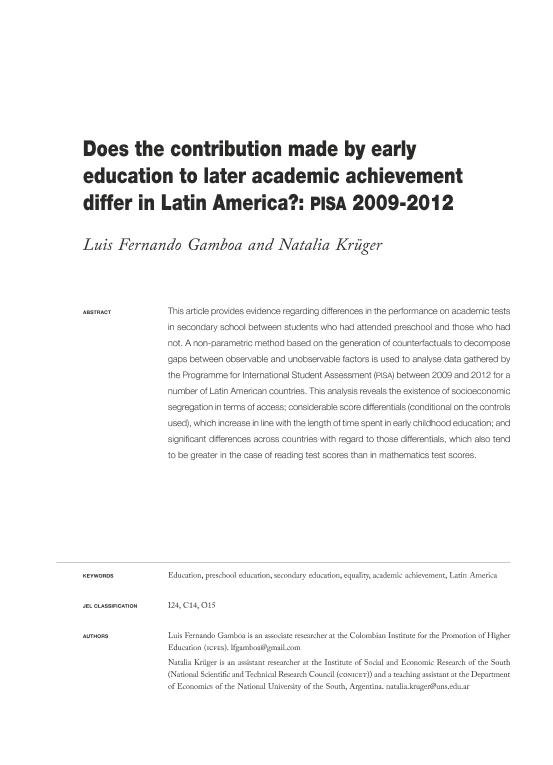Mostrar el registro sencillo del ítem
dc.contributor.author
Gamboa, Luis Fernando
dc.contributor.author
Krüger, Natalia Soledad

dc.date.available
2018-08-02T18:44:15Z
dc.date.issued
2016-04
dc.identifier.citation
Gamboa, Luis Fernando; Krüger, Natalia Soledad; Does the contribution made by early education to later academic achievement differ in Latin America?: PISA 2009-2012; Comisión Económica para América Latina y el Caribe; Cepal Review; 118; 4-2016; 81-96
dc.identifier.issn
0251-2920
dc.identifier.uri
http://hdl.handle.net/11336/53938
dc.description.abstract
This article provides evidence regarding differences in the performance on academic tests in secondary school between students who had attended preschool and those who had not. A non-parametric method based on the generation of counterfactuals to decompose gaps between observable and unobservable factors is used to analyse data gathered by the Programme for International Student Assessment (PISA) between 2009 and 2012 for a number of Latin American countries. This analysis reveals the existence of socioeconomic segregation in terms of access; considerable score differentials (conditional on the controls used), which increase in line with the length of time spent in early childhood education; and significant differences across countries with regard to those differentials, which also tend to be greater in the case of reading test scores than in mathematics test scores.
dc.format
application/pdf
dc.language.iso
eng
dc.publisher
Comisión Económica para América Latina y el Caribe
dc.rights
info:eu-repo/semantics/openAccess
dc.rights.uri
https://creativecommons.org/licenses/by-nc-sa/2.5/ar/
dc.subject
Education
dc.subject
Preschool Education
dc.subject
Secondary Education
dc.subject
Equality
dc.subject
Academic Achievement
dc.subject
Latin America
dc.subject.classification
Economía, Econometría

dc.subject.classification
Economía y Negocios

dc.subject.classification
CIENCIAS SOCIALES

dc.title
Does the contribution made by early education to later academic achievement differ in Latin America?: PISA 2009-2012
dc.type
info:eu-repo/semantics/article
dc.type
info:ar-repo/semantics/artículo
dc.type
info:eu-repo/semantics/publishedVersion
dc.date.updated
2018-06-22T14:21:47Z
dc.journal.volume
118
dc.journal.pagination
81-96
dc.journal.pais
Chile

dc.journal.ciudad
Santiago de Chile
dc.description.fil
Fil: Gamboa, Luis Fernando. Instituto Colombiano Para la Evaluación de la Educación; Colombia
dc.description.fil
Fil: Krüger, Natalia Soledad. Consejo Nacional de Investigaciones Científicas y Técnicas. Centro Científico Tecnológico Conicet - Bahía Blanca. Instituto de Investigaciones Económicas y Sociales del Sur. Universidad Nacional del Sur. Departamento de Economía. Instituto de Investigaciones Económicas y Sociales del Sur; Argentina
dc.journal.title
Cepal Review
dc.relation.alternativeid
info:eu-repo/semantics/altIdentifier/url/https://www.cepal.org/en/publications/40430-does-contribution-made-early-education-later-academic-achievement-differ-latin
Archivos asociados
